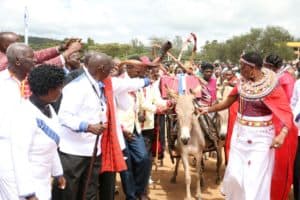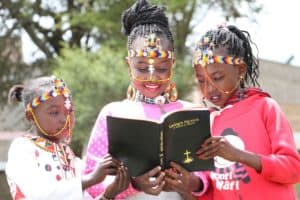The Samburu of Kenya’s Rift Valley dedicated the New Testament in their language, as well as an accompanying dictionary, on Jan. 4 at Maralal Stadium in Samburu County. The event was attended by about 3,000 people.
Until now, the Samburu have tended to use the Maasai translation. Although they generally understand this translation, there are issues with comprehension and some of the Maasai words are offensive or derogatory to the Samburu. This has been a contributing factor to the Samburu not fully understanding the Christian faith and therefore mixing it with traditional religion.

The Samburu New Testament arrives by donkey. © Bible Translation and Literacy (BTL)
“When the Bible becomes available in local languages, it becomes a tool for evangelism and discipleship,” says Peter Munguti, national director of Bible Translation and Literacy (BTL), one of Wycliffe’s partner organizations in Kenya.
“We believe that having the New Testament in Samburu will transform this region.”
A total of 5,000 printed copies were produced; all have been sold and are already being used by the Samburu people. The audio version was also available at the dedication, and 162 SD cards with the audio version were sold that day. The BTL Scripture engagement team will be making trips this month to distribute more SD cards.
The Samburu are a largely nomadic people of about 160,000 whose source of life is their livestock. The indigenous Samburu Church is quite small, with a few local boma/manyatta churches (household churches) here and there. Only 10–12 per cent of the Samburu are Christian.
As the Samburu move around the country, they may not have a local pastor or missionary who travels with them. Also, the adult literacy rate is only about 20 per cent. So having the audio version as well as the printed version will boost a fledgling church with few church leaders and a low literacy rate.
Julia Leaduma, a Samburu who attended the dedication said: “Today is a day of happiness for Samburus because we now have our own Bible. We now know that Jesus understands Samburu language too.”
Translation work began in 2006, and the first Scriptures (the Gospel of Luke) were published in 2014. While Wycliffe workers have contributed throughout the process, much of the work has been done by local Samburu and BTL team members. Translation of the Old Testament is ongoing and the aim is to have a complete Samburu Bible in a few years.

Samburu girls read the New Testament in their language. © Bible Translation and Literacy (BTL)
The dictionary is aimed at Samburu people who already speak and read English, and would like to get the most out of the Bible in their mother tongue. Janet Sweet, who serves with Wycliffe, worked on the dictionary.
“The dictionary aims to be a storehouse and reference point for cultural information,” she says. “It will be used primarily by Samburu people who have been educated in English and would like to connect more with their culture.
“They will use it as an accompaniment to the New Testament, helping them to understand their mother tongue more deeply and enabling them to look up words they are not familiar with.”
Adapted from an article at wycliffe.org.uk

